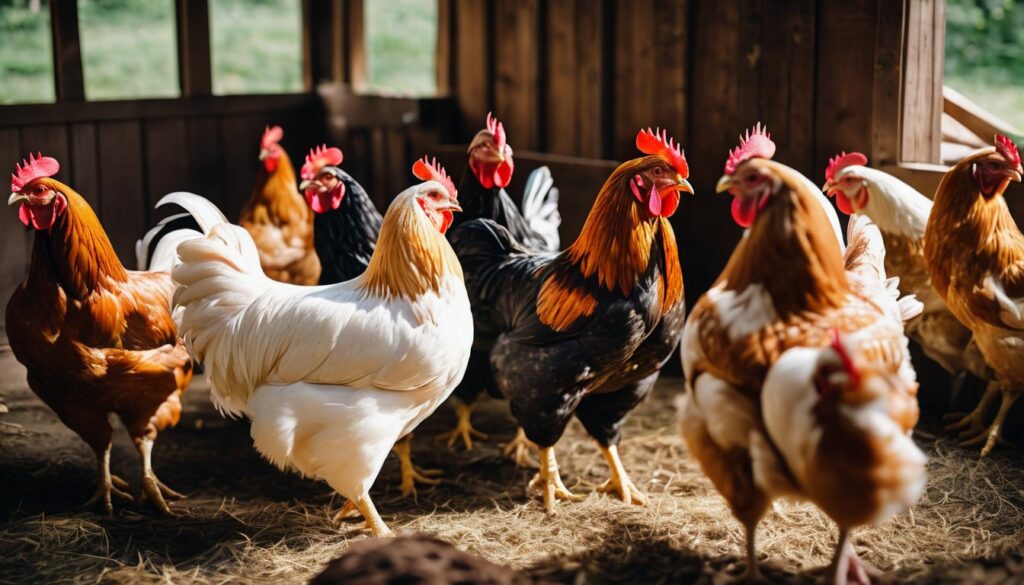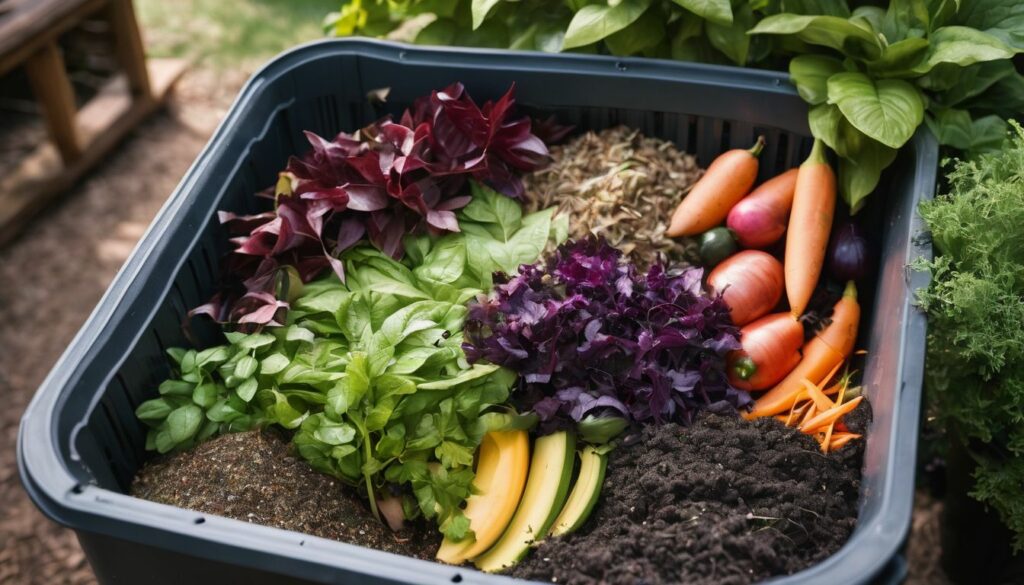Struggling to wrap your head around the importance of poultry feed and its impact on their health and productivity? You’re not alone. Fun fact: feed comprises a significant slice of the production cost pie in poultry farming! This blog post is designed to guide you step-by-step through the pivotal world of poultry feeding — from choosing appropriate feeds, pondering over essential nutritional elements, right down to sharing handy tips for optimal feeding methods for different stages and bird varieties.
So straighten up those farmer hats; it’s time we dive deep into how small adjustments in your birdie’s diets can lead them towards soaring performances!
Key Takeaways
- Poultry feed plays a crucial role in their health and productivity, with significant implications for the production process.
- Different types of poultry feed include scratch grains, table scraps, clippings, medicated feeds, and supplements.
- Factors to consider in poultry feeding include nutritional needs, water requirements, anti – nutritional factors, and feed ingredients.
- Proper feeding practices for different stages and types of poultry are essential for their growth and development.
Types of Poultry Feed
There are various types of poultry feed available, including scratch grains, table scraps, clippings, medicated feeds, and supplements.
Scratch grains
Scratch grains are a kind of food for birds. Chickens, ducks and turkeys love them. They are like treats and should not be all the chickens eat. Scratch grains do not have everything your poultry needs to stay strong and healthy.
Feeds with corn, barley or oats can be used as scratch grains. Just make sure they don’t replace other feeds that give all needed nutrients to your birds. Birds peck at scratch grains for fun and it keeps them busy! So, if you want happy hens, feed them some scratch grains but do it right.
Table scraps
Table scraps can be a convenient and cost-effective option for feeding poultry. They are leftover food scraps from our own meals that we can give to the birds. When choosing table scraps, it’s important to select nutritious options like leafy vegetables and avoid foods that may harm the birds, such as those with high salt content or seasonings.
Additionally, it’s crucial to ensure that the table scraps provided are fresh and free from any mold or contaminants. By incorporating table scraps into their diet, poultry can benefit from added variety in their feed, which helps promote overall health and well-being.
Clippings
Clippings are a type of poultry feed that can be beneficial for birds. Clippings refer to fresh plant materials such as grass, weeds, and leafy vegetables that are cut or harvested and then fed to the birds.
This helps in adding variety to their diet and providing natural sources of vitamins and minerals. Clippings are especially useful when other types of feed may be scarce or expensive.
Feeding clippings can also help reduce waste by using parts of plants that would otherwise go unused. However, it is important to note that not all plant clippings are suitable for poultry consumption, as some may be toxic or have unwanted effects on bird health.
Medicated feeds
Medicated feeds are a type of poultry feed that contain medication to prevent or treat diseases in the birds. These medications may include antibiotics, coccidiostats, or other drugs.
The use of medicated feeds helps to keep the birds healthy and prevent the spread of diseases within the flock. This can be particularly important in large-scale poultry production where disease outbreaks can have significant economic impacts.
Veterinarians and nutritionists work together to develop appropriate medicated feed formulations based on the specific needs of the birds and the prevalent diseases in their environment.
Supplements
Supplements are additional nutrients that can be added to poultry feed to enhance their overall health and productivity. These supplements may include vitamins, minerals, probiotics, and herbal extracts.
They provide extra support for the birds’ immune system, digestion, and growth. For example, vitamin C supplements can help chickens combat stress and improve egg production. Adding probiotics to the feed can promote a healthy gut flora and reduce the risk of bacterial infections.
By including supplements in the diet of poultry, farmers can ensure that their birds receive all the necessary nutrients for optimal growth and performance while minimizing health issues.
Factors to Consider in Poultry Feeding
When it comes to poultry feeding, there are several crucial factors that need to be taken into consideration.
Nutritional needs
The nutritional needs of poultry are crucial for their growth and overall health. A balanced diet is essential to provide the necessary nutrients for bone development, feather production, muscle growth, and egg-laying.
Proper nutrition prevents health issues and maximizes productivity in poultry flocks. The feed should contain a combination of proteins, carbohydrates, fats, vitamins, and minerals to support the birds’ specific requirements at different stages of life.
Quality feed plays a significant role in ensuring that poultry receive the right amount of nutrients they need to thrive.
Water requirements
Water is an essential component of a poultry’s diet, and it plays a crucial role in their overall health and productivity. Just like humans, birds need water to survive. They require clean and fresh water at all times for drinking, digestion, temperature regulation, and other bodily functions.
In fact, water makes up about 70% of a bird’s body weight! To ensure optimal hydration, it is important to provide enough water sources for the flock and regularly check that these sources are clean and free from contaminants.
Adequate water supply helps prevent dehydration, improves feed utilization, promotes egg production in laying hens,, aids in nutrient absorption,and supports overall flock health. So always make sure your feathered friends have plenty of clean water available to them!
Anti-nutritional factors
Anti-nutritional factors are substances in poultry feed that can reduce the availability of nutrients or even harm the birds. Some common anti-nutritional factors include certain plant compounds, such as tannins and phytates, which bind to essential minerals and make them less absorbable by the birds’ bodies.
Other examples include mycotoxins produced by molds on feed ingredients, which can cause health issues in poultry. It is important to identify and minimize these factors in order to ensure optimal nutrition for the birds and maximize their growth and productivity.
Regular testing of feed ingredients for toxins and proper storage practices can help prevent these issues from occurring.
Feed ingredients
When it comes to poultry feed, the ingredients that go into it are very important. The feed needs to provide all the essential nutrients for the birds to stay healthy and grow properly.
Some common feed ingredients include grains like corn and wheat, protein sources like soybean meal or fish meal, vitamins and minerals, and fats or oils. These ingredients are carefully chosen to create a balanced diet for the birds.
It’s important for farmers to select high-quality feed ingredients to ensure their chickens have nutritious meals every day.
Proper Feeding Practices for Different Stages and Types of Poultry
Feeding poultry at different stages and types requires specific practices to ensure their nutritional needs are met. Whether it’s feeding for egg production, chicks, meat birds, or show poultry, understanding the right feed and feeding methods is crucial for healthy and thriving birds.
Read on to learn more about the importance of proper feeding practices in poultry production.
Feeding for egg production
Feeding the right diet to hens is important for egg production. A balanced and nutritious diet helps hens lay healthy eggs regularly. Hens need a high-protein feed that contains essential amino acids, vitamins, and minerals to support their reproductive system.
Calcium is especially important as it helps in forming strong eggshells. Feeding practices should be consistent, with fresh water available at all times. The timing of feeding can also impact egg production, as hens require sufficient daylight hours for optimal laying.
By providing a good diet and proper care, we can ensure a steady supply of fresh and nutritious eggs from our flock.
Feed for chicks
Feed for chicks is crucial for their growth and development. Chicks have specific nutritional needs in their early stages, and the right feed helps them grow into healthy adult birds.
Starter feeds are specially formulated to provide essential nutrients like protein, vitamins, and minerals that support bone and muscle development. These feeds also ensure proper feathering, which helps chicks regulate body temperature.
Feeding chicks a balanced diet from the beginning sets them up for a productive life as they mature into egg-laying or meat-producing birds. It’s important to choose high-quality chick feed to give them the best start in life.
Feed for meat birds
Feeding the right diet to meat birds is essential for their growth and development. These birds have specific nutritional requirements that need to be met in order to ensure healthy muscle development and weight gain.
The feed given to meat birds is usually high in protein, which helps them build strong muscles. It also contains essential vitamins and minerals that support their overall health. By providing the right feed, we can help maximize the growth potential of meat birds, ensuring they reach optimal size for processing.
Feeding methods such as ad libitum feeding, where food is available at all times, can help promote efficient growth in meat birds. And by carefully selecting and formulating their feed, we can contribute to producing high-quality poultry products for consumers.
Feed for show poultry
Feeding show poultry is a crucial part of preparing them for competitions and exhibitions. It’s important to provide them with a balanced diet that promotes their overall health and enhances their appearance.
Show poultry feed often includes high-quality ingredients such as grains, proteins, vitamins, and minerals. This specialized feed helps maintain the birds’ energy levels, muscle development, feather condition, and vibrant plumage.
By providing optimal nutrition through their feed, we can ensure that show poultry are in prime condition to compete and showcase their beauty on the big day.
The Importance of Quality Feed for Healthy Birds and Eggs
Quality feed plays a vital role in ensuring the health of poultry birds and the production of nutritious eggs.
Non-GMO and organic options
When it comes to poultry feed, there are non-GMO and organic options available. These choices focus on providing birds with feed that is free from genetically modified organisms and pesticides.
Non-GMO feed ensures that the birds are consuming natural ingredients without any genetic modifications. On the other hand, organic feed goes a step further by also being produced without synthetic chemicals or fertilizers.
By opting for non-GMO and organic options, farmers can promote healthier diets for their poultry, which in turn can have positive effects on egg production and overall bird health.
Effects on egg production
Proper feed plays a significant role in the production of high-quality eggs. The nutrients in the feed support the development and health of laying hens, which directly affects egg production.
A well-balanced diet that provides essential vitamins, minerals, protein, and carbohydrates is crucial for maximizing egg output. Poor nutrition can lead to decreased productivity and even fewer eggs laid by the hens.
Additionally, certain nutrients like calcium are especially important for strong eggshells. When hens receive inadequate nutrition, their egg quality may suffer, resulting in thin or weak shells that are more prone to breakage.
Effects on bird health
Proper nutrition is crucial for maintaining the health of poultry birds. The feed they consume directly affects their overall well-being. Birds that receive a balanced and diverse diet with all the necessary nutrients are less prone to diseases and have stronger immune systems.
Nutrients in the feed promote healthy bone development, proper feather growth, and optimal egg production. On the other hand, inadequate nutrition can lead to various health issues such as weakness, stunted growth, poor feather quality, and decreased egg production.
By providing high-quality feed that meets their nutritional needs, we can ensure that our birds stay healthy and thrive.
Conclusion
Feeding poultry is crucial for their health and productivity. The nutrition provided through the feed directly affects their performance and the quality of eggs they produce. By ensuring a balanced and diverse diet, poultry farmers can maximize their flock’s productivity and maintain their overall health.
FAQs
1. What is the significance of poultry feed in the production process?
The quality and type of poultry feed, like chicken, duck or turkey feed plays a big part in flock health and growth. It also effects how well birds will grow.
2. How does poultry nutrition impact poultry health?
Good nutrition helps keep birds healthy. Poultry feeding methods and additives can help with this. Bad nutrition can lead to many diseases which slows down growth.
3. What are important ingredients in poultry feed?
Poultry feed formulation has different things like NonGMO feeds, pellets and other items that do not hurt bird’s health called antinutritional factors.
4.How does the selection of good qualityfeeds affect my poultry production efficiency?
A good choice of high-quality foods leads to better bird’s growth and health. This increases your output leading to better results for your work.
5.What role does the poultry feed industry play in our economy?
The industry makes a lot for us! They make food for all types of farm birds using best practices making them fast growing . A healthy flock means more meat or eggs that they give which people want to buy!





